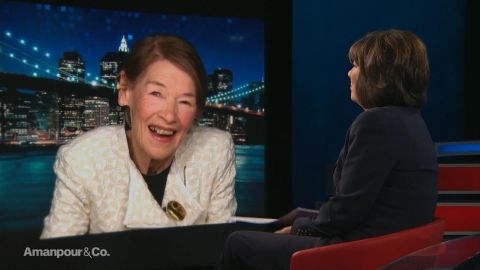Read Transcript EXPAND
CHRISTIANE AMANPOUR: It is exhausting, right? I mean, it’s very physical and all-encompassing performance.
GLENDA JACKSON, ACTRESS, “KING LEAR”: Well, it is and it isn’t. I mean, I’m used to eight shows a week. I mean, that was the work toll, that it was practiced in England when I began, and still is. But there is enormous energy in the play itself. And if you can touch into that energy, and we do as a company, then, really, I mean, I sometimes feel more energized when it’s — when we’ve done it than when I started.
AMANPOUR: And I wonder whether — because you’ve also said that you think, you know, Shakespeare is perhaps one of the most, if not the most contemporary of playwrights. And given all —
JACKSON: Oh, he is. Undoubtedly.
AMANPOUR: Yes. And we’ve just been talking about leadership —
JACKSON: Yes.
AMANPOUR: — and power and corruption and breakup and ethics. Where does he fit in for you? Why do you call him still so contemporary?
JACKSON: Well, because he essentially only ever writes about us, about human beings. And human nature is immutable. Yes, we can and we do when we’re still trying to improve the human condition. But we, as human beings, don’t change that much. And there are tropes in the play that are absolutely reflected in the world as we know it today.
When I was particularly interested hearing the previous piece about power and leadership because Lear says in the play that he was flattered like a dog as the king. People said to him aye and no to everything he said. And the line is, “Aye and no, too, is no good divinity.” And so, that is something that is still prevalent now.
AMANPOUR: Now, continuing that theme, this particular production of “King Lear” takes place, essentially in a single kind of gilded room. And —
JACKSON: Yes.
AMANPOUR: — you know, it then turns into a bit of a ruin in the second part. But nonetheless, as you can imagine, given the times we’re living in, some of the theater critics have said, “Well, that room, that sort of – – that room must be Trumpian. It must be the Trump tower conference room.” I mean, do you ever think about that? Is there any kind of truth to that at all?
JACKSON: I think there may have been something there in the background but certainly, Lear is not that kind of person. I mean, the point about Lear is that he’s a man who no one has ever said no to in his entire life. He was born to that position of power. He’s, obviously, conducted it well. He says he’s handing it over to younger strength than his because he wants to have a peaceful retirement, ideally with his youngest, most favorite daughter in probably the most favorite place in this kingdom. And it doesn’t happen like that.
About This Episode EXPAND
Christiane Amanpour speaks with Eric Schmidt and Alan Eagle about privacy, democracy and the spread of extremism on the internet. She also speaks with actor Glenda Jackson about her role in “King Lear” on Broadway. Alicia Menendez speaks with filmmaker Phillip Youmans about “Burning Cane,” the 19-year-old’s first film that won three awards at this year’s Tribeca Film Festival.
LEARN MORE


